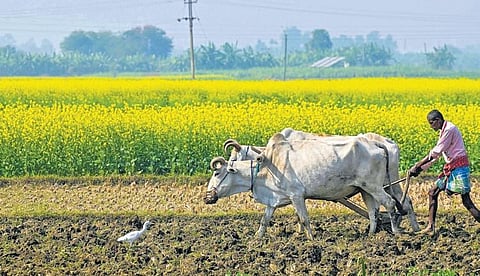

A crucial hearing in the Supreme Court that will determine the fate of genetically modified organisms (GMO) entering our food chain, has been put off by a couple of weeks to October 12. It is expected to be the final hearing on the environmental release of genetically modified (GM) and herbicide-tolerant (HT) mustard.
Though the matter of environmental release is before the court, the GM mustard hybrid DMH-11 and its parental lines developed by the Centre for Genetic Manipulation of Crop Plants, University of Delhi South Campus for 2022-23 was released last year for tests in eight government-controlled locations in North India.
However, DMH-11 seeds were delivered for planting on October 22, 2022, a few days before a formal approval letter was given to the crop applicant on October 25, 2022, the Coalition for a GM-Free India alleges.
The government had given an undertaking in the SC on July 28, 2017 that it will not create a fait accompli - getting the seeds tested even before the court’s approval. Yet, it went ahead and did exactly that on October 22, 2022, the Coalition charges.
Kavitha Kuruganti, a representative of The Coalition for a GM-Free India, fears the seeds of GM mustard currently being cultivated in the eight different locations, could ultimately end up in various farms illegally, just as HT Bt cotton seeds did back in 2002.
“Those farmers will end up being criminalised for illegally sowing the seeds, as they can’t be used for commercial cultivation as per the Environment (Protection) Act of 1986. Farmers could also be penalised as per the insecticides Act, 1968. It is a non-bailable offence,” she cautions.
“We have a situation where the farmer will use this herbicide tolerant variety out of desperation to save `1,000 to avoid paying labourers for weeding,” she notes. Remember those involved in the weeding out process to make a living are mostly women farm labourers. Kavitha warns that diverse cropping and natural farming would be affected, which would encourage “wrong farming”.
Honey bees, she feels, would be the most threatened due to GM mustard, as honey is mostly produced in honey bee boxes placed in mustard farms. India’s export of honey is more than its import. If GM traces are found in the exported honey, all those lots could be rejected, she cautions. In its report titled “Statutory Regulatory Violations & Procedural Infirmities in GM Mustard Appraisal & Approval in India’’, the Coalition had submitted to the SC bench that in the 136th meeting of Genetic Engineering Appraisal Committee (GEAC) held on September 20, 2018, it was decided that any pesticide that adversely impacted honey bees shouldn’t be used in the field demonstration studies on honey bees and other pollinators. Yet, honey bee boxes were placed in the GM mustard test farms.
When asked about his observations as the member representative of GEAC’s post-release monitoring committee (PRMC), which visited five sites where DMH-11 were sown, Prof S J Rahman, Head of the Department of Entomology, Agricultural Research Institute, Prof Jayashankar Telangana State Agricultural University, said the GM seed had undergone event selection and two stages of biosafety levels tests before reaching the environmental release stage.
Without going into specifics, he said a lengthy standard operating procedure was followed for approving DMH-11 before their trials in Rajasthan, UP, Punjab and Delhi.
The GEAC’s minutes of its 150th meeting on August 10 last says the post-release study of GM mustard found the condition in general looked good with a robust crop stand. “There was good seed set across all the entries at all the six locations indicating that there had been good activity of honey bees and pollinators on all the entries including GE mustard hybrid,” the minutes read.
Swadeshi Jagran Manch is on the same page
It’s not just organisations at the opposite end of the Centre’s ideological spectrum that are opposing the introduction of genetically modified organisms in the country. The Swadeshi Jagran Manch (SJM), part of the RSS family, is on the same page. It hopes the Supreme Court would force the Centre’s hand by ruling against the cultivation of GM mustard in the country.
Ashwani Mahajan, national co-convener of SJM and Professor of Economics at Delhi University says no field trials were done on GM mustard’s impact on human health and environment, and its approval for environment trials at eight locations was a fait accompli. If GM food crops get approval for commercial production, companies would try to push their seeds to establish monopoly, he argues. “After the introduction of Bt cotton seeds, all indigenous cotton seeds vanished from the markets. Even the committee formed by the Supreme Court had stated in its report that genetically modified seeds shouldn’t be allowed in food crops of Indian origin,” he says.
Pointing to the high rate of farmer suicides in areas like Vidarbha are mostly among Bt cotton cultivators, he says the steady drop in cotton production is undisputed. “The claim of high yield of Bt cotton is a lie. If productivity has at all improved, it is because of more areas being brought under cultivation. Earlier cotton used to be alternated with other crops. But now it has become a monoculture,” he notes.
Pointing out that India has been exporting agricultural produce amounting to $50 billion per year to various countries and regions, including the European Union and the Gulf, he says it is because they are non-GM. If GM food crops are introduced, importers could stop procuring, which would severely impact domestic production and exports. SJM national committee member S Lingamurthy, who is Professor, Department of Economics at the Central University of Karnataka, says seed sovereignty and biodiversity will be lost if GM seeds are allowed. Farmers, he warns, would become dependent on multinational companies for seeds, fertilisers and other products.